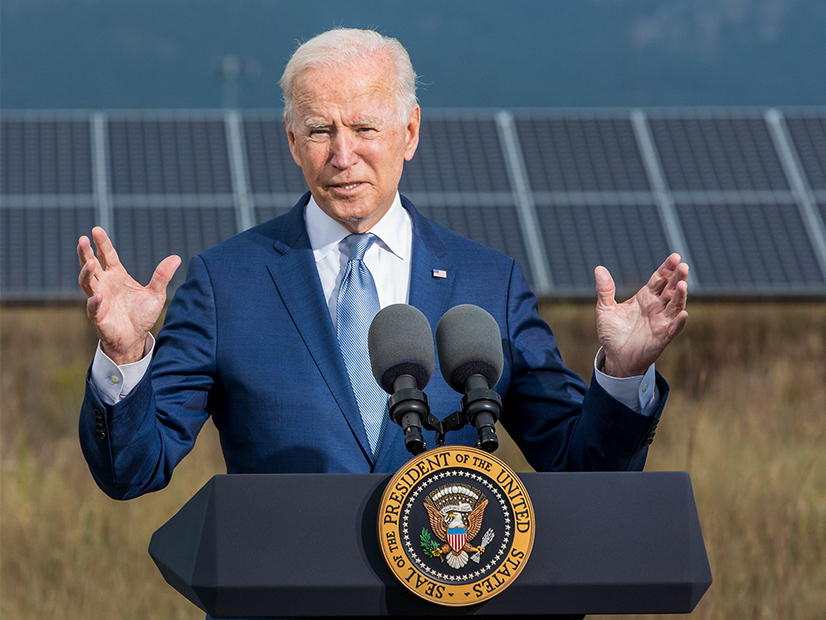President Joe Biden on Tuesday made good on his pledge to veto a proposed resolution that would have rolled back a two-year moratorium on solar tariffs imposed on cells and panels produced in Cambodia, Malaysia, Thailand and Vietnam.
Passed with bipartisan support in the House of Representatives and the Senate, the bill, H.J. Res. 39, “disapproved” the moratorium and declared it “shall have no force or effect.”
The House passed the resolution on April 28, by a vote of 221-202, with 12 Democrats joining the GOP majority and eight Republicans opposing the measure.
Nine Democratic senators supported the measure in the Senate, where it passed on a 56-41 vote on May 3. The Democrats voting for the resolution were senators Joe Manchin, (W.Va.), Sherrod Brown (Ohio), Ron Wyden (Ore.), Bob Casey (Pa.), Jon Tester (Mont.), Debbie Stabenow (Mich.), Gary Peters (Mich.), John Fetterman (Pa.) and Tammy Baldwin (Wis.).
Because neither house is likely to muster the two-thirds majority needed to override the veto, the House and Senate votes and the resolution itself were mostly political posturing, giving Democrats and Republicans cover to appear tough on China and the solar industry’s ongoing reliance on overseas suppliers. About 80% of solar panels used in the U.S. come from the four Asian countries in question, according to the Commerce Department.
In his veto message to the House, Biden characterized the moratorium, which the Commerce Department issued in June 2022, as a “24-month bridge” to allow the buildout of a domestic solar supply chain that will break the industry’s dependence on Southeast Asian countries and China.
Since the passage of the Inflation Reduction Act, Biden said, “private companies have announced commitments to build enough solar panel manufacturing capacity to power nearly six million homes.
“America is now on track to increase domestic solar panel manufacturing capacity eight-fold by the end of my first term. But that production will not come online overnight,” he said. “The Department of Commerce’s rule supports American businesses and workers in the solar industry and helps provide sufficient, clean and reliable electricity to American families, while continuing to hold our trading partners accountable.”
The veto message also repeated Biden’s commitment that he will not extend the moratorium when it expires in June 2024.
The president ordered the waiver on tariffs on solar panels and cells imported from Cambodia, Malaysia, Thailand and Vietnam last year, after the Commerce Department announced an investigation into whether panels and cells from those countries contain components from China that would be subject to tariffs. (See Biden Waives Tariffs on Key Solar Imports for 2 Years.)
Reactions
Industry trade groups and individual installers were quick to back the president’s action.
“President Biden’s veto has helped preserve our nation’s clean energy progress and prevented a bill from becoming law that would have eliminated 30,000 American jobs, including 4,000 solar manufacturing jobs,” said Abigail Ross Hopper, CEO of the Solar Energy Industries Association (SEIA). “This action is a reaffirmation of the administration’s commitment to business certainty in the clean energy sector and a signal to companies to continue creating jobs, building domestic manufacturing capacity and investing in American communities.”
Gregory Wetstone, CEO of the American Council on Renewable Energy, agreed. “President Biden’s veto today is a welcome step to avoid a disastrous impact on the U.S. economy and ensure continuing progress toward the clean energy transition and our climate goals,” he said. “The [resolution] passed by Congress would have changed the rules renewable developers and manufacturers rely upon, resulting in many dozens of canceled solar projects, tens of thousands of lost jobs, and a dangerous increase in carbon emissions.”
George Hershman, CEO of SOLV Energy, a utility-scale solar contractor, said the veto would “provide clarity to domestic solar manufacturers and allow the industry to move forward on important projects that boost solar deployment.”
On the other side, Rep. Dan Kildee (D-Mich.), one of the Democrats who voted for the resolution in the House, expressed disappointment with the veto and called for an override vote.
“Failing to stand up to those who engage in unfair trade practices hurts American workers and manufacturers,” Kildee said in a statement Tuesday. “Our workers and businesses will never be able to compete globally unless we hold those who violate U.S. trade laws accountable. The Biden administration found, in its own investigation, that Chinese companies are violating the law. Yet the president’s position, and today’s veto, fails to hold China accountable and hurts American workers.”
Robbie Diamond, CEO of SAFE, a group focused on reducing U.S. dependence on foreign oil, appeared to favor a tariff rollback, as reported in The New York Times.
“We must back up the message of wanting to build a U.S. supply chain with action — even if it is difficult and complicates some deployments,” Diamond said. “If we’re going to talk the talk, we must walk the walk.”
The Supply Chain Buildout
Prior to the passage of the Infrastructure Investment and Jobs Act and Inflation Reduction Act, tariffs on Chinese solar panels and cells were not particularly effective in kickstarting a domestic supply chain. Even after former President Donald Trump approved the tariffs on Chinese solar panels and cells in 2018, the solar industry continued its dependence on Southeast Asian and Chinese manufacturers.
Despite heavy lobbying by the solar industry, Biden extended the tariffs in February 2022, with an exemption for bifacial panels. (See Biden to Veto Bipartisan Rollback of Solar Tariff Moratorium.)
But the announcement of the Commerce Department investigation the following month threw the industry into an uproar, with more than 300 projects delayed or canceled, according to SEIA. Biden’s moratorium, and the IIJA’s and IRA’s tax credits, finally provided the impetus for companies to start investing in new facilities in the U.S.
The American Clean Power Association recently reported that more than $150 billion in domestic utility-scale clean energy investments have been announced in the last eight months. “This amount is equivalent to five years’ worth of American clean energy investments, surpassing total investment into U.S. clean power projects commissioned between 2017 and 2021,” ACP said.
Even so, there’s no guarantee that an adequate domestic supply chain will be up and running by June 2024, when the moratorium runs out.
The Commerce Department issued a preliminary finding in the investigation in December, stating that “certain Chinese solar panel manufacturers were indeed attempting to bypass the [tariffs] via transport through these investigated Southeast Asian partners.” A final decision has been pushed back from May to August.


